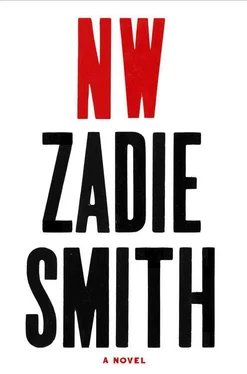— That’s not what happened! He’s talking about Nathan Bogle. He was selling travelcards. You know how he does that, you’ve seen him do that, at Kilburn, at Willesden sometimes?
— Hmmm.
It’s humiliating being the cause of so much abject boredom in your oldest friend. Leah is reduced to bringing up these old names and faces in an attempt to engage her.
Frank says:
— Bogle? He the one who was caught for heroin importing?
— No, that was Robbie Jenner. Year below. Bogle wasn’t in that league. He dropped out to become a footballer. Spike, please don’t do that, baby.
— And did he? Become a footballer?
— Huh? Oh — no. No.
Perhaps Brayton, too, no longer exists for her. It’s gone, cast off. She is probably as surprised to have come out of Brayton as it is surprised to have spawned her. Nat is the girl done good from their thousand-kid madhouse; done too good, maybe, to recall where she came from. To live like this you would have to forget everything that came before. How else could you manage?
— He was a sweet kid. His mum was St. Loo-shun. St. Looshee-yan? All our mums knew each other. Very nice looking, very mischievous. Played the drums? Quite well. He sat next to Keisha. Back when she was Keisha. I was very jealous about that, when I was eight. Innit, Keisha.
Natalie chews at a nail, hating to be teased. She dislikes being reminded of her own inconsistencies. Leah dares herself to put it a little stronger: hypocrisies. Leah passes the old estate every day on the walk to the corner shop. She can see it from her back yard. Nat lives just far enough to avoid it. Anyway all meetings happen here, at Nat’s house, because why wouldn’t they. Look at this beautiful house! Leah blushes as an illegal word thrusts itself into her mind, Shar’s word: coconut. And then Michel speaks, and makes it perfect.
— You changed your name. I forget that you did this. It’s like: “Dress for the job you want not the one you have.” And it’s the same with names, I feel.
Ruined for Leah, though, by this depressing I feel , which he only ever says here, in this house, and which is embarrassing. Natalie’s eyes widen; she lunges at a change of subject, which children always seem to provide.
— Michel, you can help me: what should I do about this?
Nat grabs two handfuls of Naomi’s hair and demonstrates the knots by trying to pass her fingers through the nest of it as the child squirms beneath.
— She won’t let me touch it, so I should give it to you to shave off, right? She can come in to the salon tomorrow and see you and get it all shaved off.
Naomi cries out. Michel answers the question, kindly, carefully, sincerely. Advising against drastic action, he recommends hair-food and coconut oil. Even after so many years in this country the English fondness for torturing children with irony remains strange to him. Nat keeps her bright smile pinned to her face.
— OK, OK, Naomi. NAOMI. Mum was only joking… No-one’s going to… yes, plaiting it in the evening should help, Michel, thank you…
Frank says:
— At my school there was no such thing as “school holiday.” My mother never saw me till Christmas.
His wife smiles sadly and gives him a kiss on his cheek:
— Oh, I bet there was. Knowing your mum she just probably never came to pick you up.
Not so funny, says Frank. Pretty funny, says Natalie. Leah watches Nat accept a daisy chain that Naomi has begun. Split a stem with a thumbnail, thread the next daisy through.
— I’m not sending my children to a boarding school. Completely alone in a class of thirty white kids. You’d have to be crazy.
— Our children. Twenty white kids. Didn’t do me any harm.
— You’re wearing loafers, Frank.
Not so funny, says Frank. Pretty funny, says Natalie. Often Leah tries to diagnose a sickness here, between these two — something rotten, something virulent — but the patients persist in leaping from their beds and wisecracking. Kissing each other on the cheek.
— You’re breakening it!
Leah looks at the daisy chain. Naomi is correct: Nat has breakened it. Now Spike finishes the job, snatching it and scattering the pieces back over the lawn. The screaming starts up. Leah assumes the bland smile of child appreciation. Frank stands up and gathers a kicking child under each arm.
— They’ll be going to church school, for our sins.
Frank’s default mode with Leah is a sort of self-parody. Leah thwarts him by faking innocence, forcing him to spell out whatever he is trying to say obliquely.
— Church school? Already?
Natalie says:
— It’s all ridiculous: it’s a free school, but apparently we need to start going to church. Put the effort in now. Otherwise they won’t get in. Somewhere not too stressful, I hope. What’s that one Pauline goes to?
— Mum? Maybe she goes once a month. To St. Somewhere, I don’t know it. I’ll ask, if you want.
Frank releases his children and sighs.
— Isn’t it your turn soon?
Michel takes that one. His topic, his realm. A conversation now begins about the inside of Leah’s body and how, if Michel had been listened to, it would have been far busier these past few years. Leah concentrates on Natalie. She is here in her body but where is her mind? At work? In some glamorous extra-marital passion? Or just wishing these people would leave so she could get back to her real life, family life?
— Damn! The banana bread. I forgot about it. Naomi, come and help me serve it up.
Leah watches Natalie stride over to her beautiful kitchen with her beautiful child. Everything behind those French doors is full and meaningful. The gestures, the glances, the conversation that can’t be heard. How do you get to be so full? And so full of only meaningful things? Everything else Nat has somehow managed to cast off. She is an adult. How do you do that?
— So… Michel. How’s it going, man? Let’s get an update. How is the hair business? Do people still… in a bad economy?
Frank’s face registers the mild panic of being left with his wife’s strange friends.
— Actually, I am moving into your region, Frank, in a small way.
— My region?
— Day trading. On the Internet. After we spoke last time, you know, I bought a book and…
— You bought a book?
— A guide… and I’ve been trying a little myself, small amounts, just to begin.
Frank’s face suggests a further explanation is needed, he detects an improbability somewhere. It is a very subtle form of humiliation but it will still be passed from Michel to Leah in some converted form, like a liquid turning to a gas, later today, or tomorrow, in an argument, in bed.
— Well, Leah’s father left her, us, a small amount.
— Oh, OK! Well, a small amount is a good place to start. But now look, I don’t want to be responsible for you losing your shirt, Michel… I work for one of the big boys, you see, and we have a sort of safety net, but when it comes to individual traders, you know, it’s worth remembering that—
Leah sighs, loudly. It’s childish but she can’t help it. Frank turns to Leah with a pacifying, weary smile. He places a corrective finger on her shoulder, a little tap.
— Michel: all I was going to say is it’s worth signing on with an online site, like Today Trader , or something like it, and playing with fake money first of all, get in the swing of things…
— Can I be excused? I think Olive needs a shit and I don’t want her to do it on your perfect lawn.
— Leah.
— No, no, no, it’s fine. Michel, we’ve known each other a very long time, Leah and I. I’m used to her funny ideas. Spike, why don’t we take Olive to the corner and back, before she goes home. Let’s go find some bags, OK?
Читать дальше











